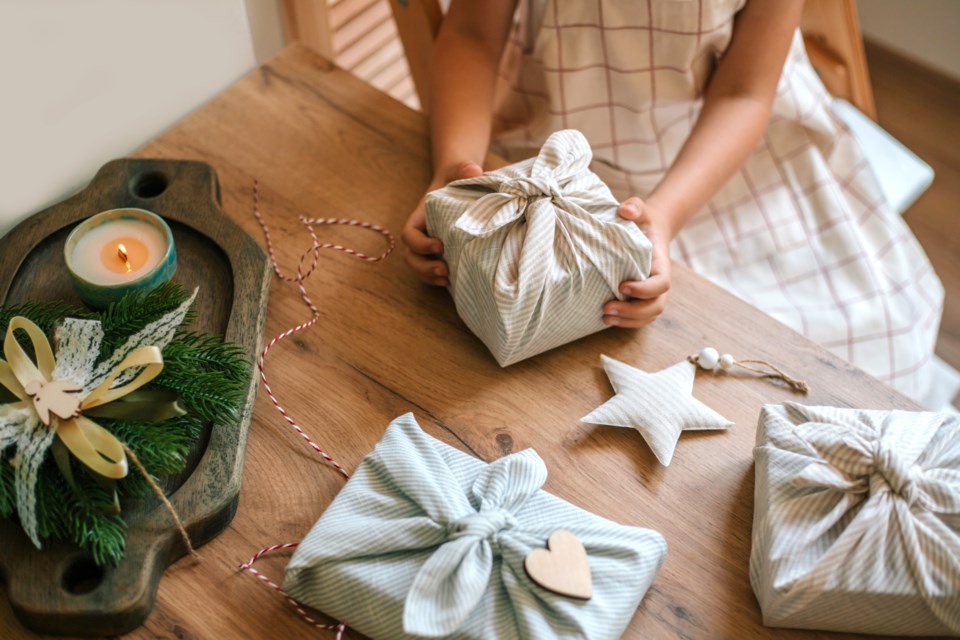With the holidays right around the corner, many people are planning festive, joyous celebrations.
But, once the merry moments are over, where will the decorations, wrapping paper, and other holiday leftovers go?
Eco-friendly alternatives and sustainable practices have become increasingly mainstream over the past year, from TikTok hacks and beauty tips across the internet to zero-waste stores and recycling-based small businesses around Vancouver.
Shopping from small, local Â鶹´«Ã½Ó³»businesses is one way to make your gift more meaningful, but choosing how you wrap that gift is one of the many ways you can make an impact over the holidays.
Ways to make the holidays sustainable
More and more people are interested in sustainable practices, notes UBC professor Dr. Kate White. Things like zero-waste gift wrapping and trends like buying second-hand are becoming more commonplace.
Still, there are several ways to decrease waste over the holidays.
Metro Â鶹´«Ã½Ó³»made a website called dedicated to ideas for making the holiday season more eco-conscious. The website lists over 200 gift and wrapping ideas.
Sustainable gifts
Wrapping paper
Wrapping paper is the most common thing to end up in the landfill after the holidays, explains White. She suggests thinking of different wrapping materials that won't end up in the garbage.
She notes that reusable items are a great alternative. "Gift bags or boxes that they would use again or wrapping it in something that they would actually use, like a tea towel or a scarf," suggests White, adding that magazines, calendars, and maps make great repurposed wrapping paper.
Create Memories, Not Garbage suggests other materials as wrapping paper too, such as jars, newspaper, plant pots, coffee cans, repurposing old wrapping paper, wrapping without tape, and ditching wrapping paper altogether.
Gift ideas
Another way to make your holiday gift sustainable would be to gift experiences rather than tangible goods, according to White.
This could be "a dinner, it could be a massage, or it could be going to a play or a show or a concert, or even a gift card for house cleaning or that you'll walk their dog," she says. "All those things are more experiential, but they don't have the sort of material tangible thing that's going to end up in the landfill at the end."
White adds that consumable gifts are another sustainable (and tasty) gift option. Baking things or taking the person for lunch reduces waste and is just as meaningful.
Metro Vancouver's website suggests other themes for low-waste gifts, including gifts that last (like a bathrobe or a bicycle), second-hand gifts, and making your own presents.
Eco-friendly holiday decorations
There are two ways of thinking about sustainability when embellishing your home, says White.
The first thing to consider is the decoration's lifespan; will you be using it each year or tossing it once the season is over?
The second approach is to think about what the decorations are made of. For this, White suggests using or making your own decorations out of compostable items.
"The worst offenders for waste are those things that you're using one time and then they end up in the trash," says White. "I'm thinking of those Christmas crackers that have the little toys and things in them but no one actually really wants those toys so they end up in the garbage."
Metro Â鶹´«Ã½Ó³»lists other alternatives for low-waste decorations, like reusable LED lights and candles, making a recycled cardboard or alternative Christmas tree, crafting a recycled giftwrap garland, turning old toys into ornaments, and upcycling socks into stockings.
Climate-conscious holiday dinners
Even the festive feast that brings together families and friends can be made more sustainable.
"Considering what you're serving can be important," says White."If you're going to serve something like beef that's going to have a higher environmental footprint than other things, you could think about [serving] something else other than the beef and thinking of the proportion of what you're offering.
"Maybe you do have a meat dish that you're serving but most of what you're serving is probably vegetables, right? [That has] a much lower environmental footprint. So thinking about what you're offering and different options might be more sustainable," explains White.
Other environmentally-friendly options during dinnertime, according to Metro Vancouver's website, are using a reusable cloth napkin rather than disposable paper one, storing leftovers in reusable containers, suggesting guests bring their own containers for taking home leftovers, buying only what you need at the store, opting for local meat and produce, and use reusable shopping bags.
Other ways to make the holidays more sustainable
Reducing travel can also help reduce our carbon impact but it can be more difficult over the holidays, adds White.
After the holidays, instead of aiming for the trash, Metro Â鶹´«Ã½Ó³»suggests trying to reuse Christmas cards, donating, regifting, or swapping unwanted gifts, and recycling shipping packaging and Christmas trees.







